Inside the Pies Part I: How Eddie McGuire restored Collingwood to AFL juggernaut
Eddie McGuire turned Collingwood’s rotting floors and decrepit facilities into the state of the art club that the rest of the league is envious of, adding some ‘razzle dazzle’ along the way.
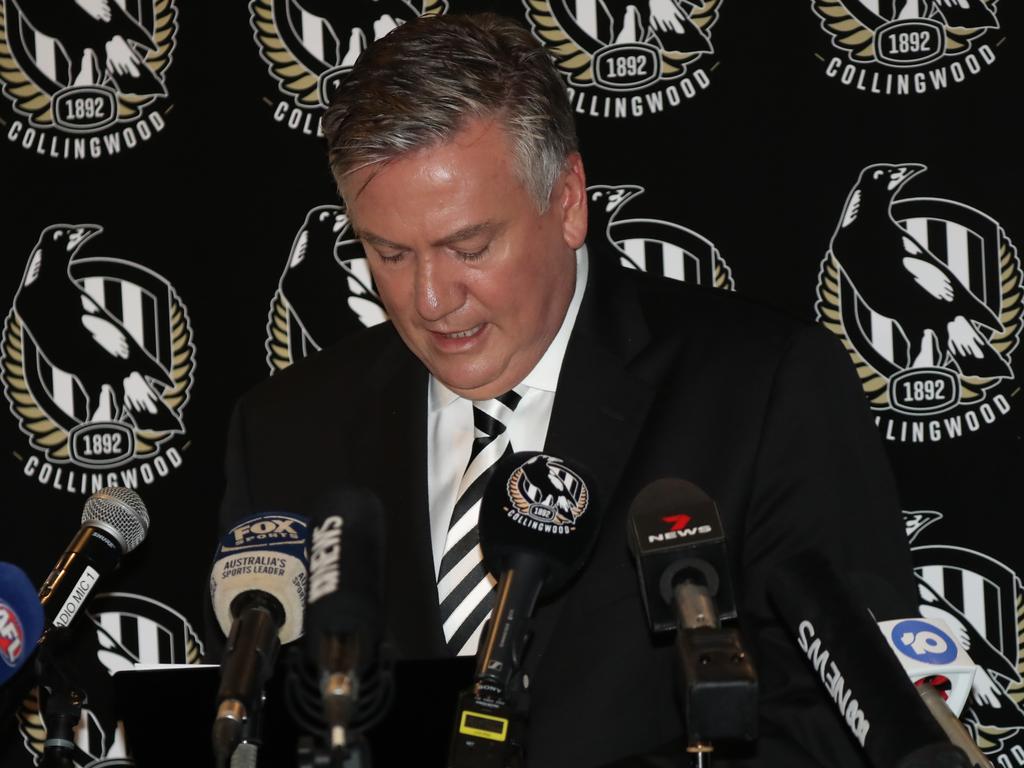
AFL
Don't miss out on the headlines from AFL. Followed categories will be added to My News.
Eddie McGuire was choking back tears.
Unlike his disastrous media conference a week earlier, this time he never deviated from his carefully prepared statement.
“I try my best and I don’t always get it right, but I don’t stop trying,” an emotional McGuire said on February 9.
“Today, effective immediately, I step down from the presidency of the Collingwood Football Club.”
Catch every moment of The Ashes live and ad-break free during play on Kayo. Join now for just $5 for 2-months Kayo Basic. New customers only, ends 13th Dec.
He was right, in the previous week he’d never stopped trying to cling on to his presidency ahead of what he’d previously announced would be his final season at the helm.
A week earlier he’d uttered the line that would expedite the end of his tenure, labelling the release of the “Do Better” report (post-leak by the Herald Sun) as a “historic and proud day for the Collingwood Football Club.”
On the Tuesday afternoon he quit the post, a Collingwood board meeting was scheduled for the following day.
Had he not stood down voluntarily at that meeting, the prevailing view is it was unlikely he would have walked out of it still as Collingwood president.
Collingwood great Peter McKenna, who remains an active Magpies supporter through the Woodsmen coterie group, said it was a sad end for an “outstanding president”.
“I think he was certainly hurt by the (Do Better) report…and I think he was sort of forced out,” McKenna said.
“I think it was very sad and that he should have seen out the year and then given it away, that’s my personal opinion.
“But I think he thought with the report that he was getting a lot of flak and thought it was better he got out early.”
Initially, McGuire thought he could spin the club-funded independent report, which had found the club guilty of systemic racism.
Historically, his instincts had largely been right when it came to controlling the narrative given his long history in the media, but this time he’d fatally overreached.
It was one of the few occasions when McGuire had failed to read the room, although these
occasions were becoming more prevalent the longer his tenure went.
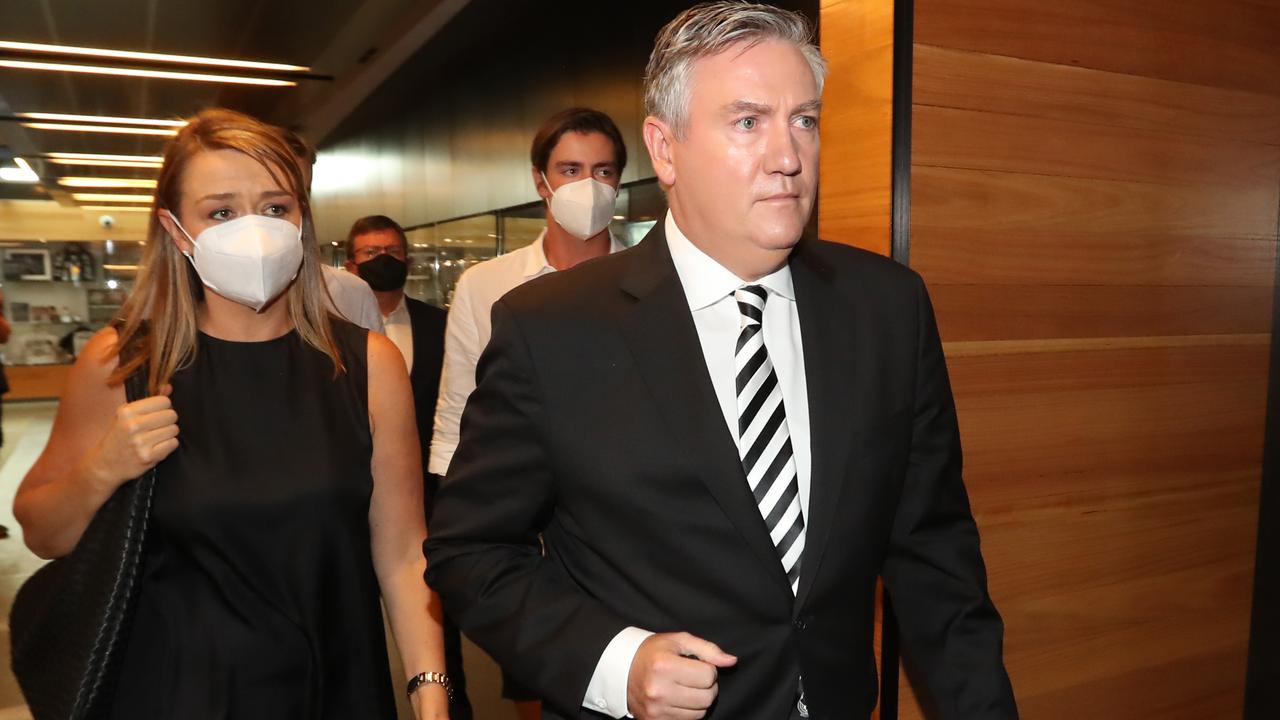
The pile-on had become frenzied.
There was some public support from the likes of premier Daniel Andrews and former AFL boss Andrew Demetriou.
And, just hours before McGuire would stand down, AFL boss Gillon McLachlan - speaking at a Kayo event in the city — refused to say whether the Magpies boss should stay out the year or exit immediately.
Instead, he said only that he’d reached out to McGuire to clarify his “proud day” declaration.
But the writing was on the wall for the TV and radio personality, who called a hastily scheduled media conference to announce he was done.
“People have latched on to my opening line last week, and as a result I’ve become a lighting rod for vitriol,” McGuire said before a no-sponsor Collingwood backdrop, which is reserved for bad news stories.
“But worse, I’ve placed the club in a position where it’s hard to move forward with the implementation of our plans with clear air.”
How did it come to this for McGuire?
It started in triumph, with the then Footy Show host taking over the presidency in 1998 on his 34th birthday.
When McGuire took charge, Collingwood was in disarray.
Not long before McGuire announced his decision to commit, he was broadcasting a dismal
Collingwood loss to the old enemy in Carlton at the MCG.
Late in the final term, he noticed a Magpies supporter get up to leave.
Before he did, he yelled “get f---ed Collingwood” before storming off.
The supporter’s heart was broken, and McGuire felt the same.
It was time to act.
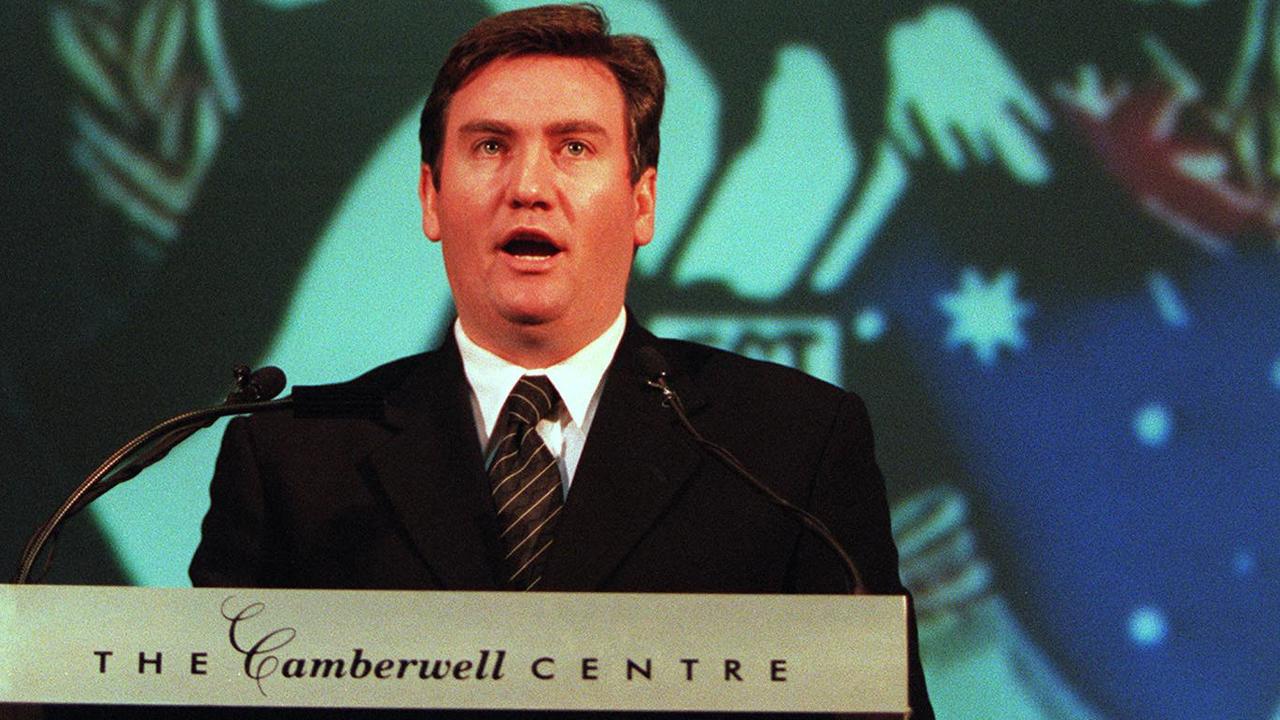
The club’s ill-fated decision to go on a buying spree around its then Abbotsford home at Victoria Park to create “Maggieland” – a club entertainment precinct – was a financial disaster.
That, coupled with its new major sponsor in Viatel failing to deliver its promised cash, spelled big off-field trouble.
Speaking on Fox Footy’s Open Mike program in 2013, McGuire admitted he held grave fears for the club.
“I was trying to help as they’d had that Viatel sponsorship disaster and suddenly it was all going pear-shaped,” McGuire said.
“It became apparent we needed to have a change and there was no one around, and no one really wanted it.
“For a moment there, and I know it sounds a bit grandiose now, but for every year you lost at that stage it was going to be five years to recover.
“We saw Fitzroy go out of business and it’s not been unusual to see clubs go that way.
“I actually thought it’s not what I should be doing for my career, I’m too young, maybe I’m not the right person for it, either.
“But I thought, gee, I’ll kick myself forever if I have kids and there’s no Collingwood.”
McGuire’s love affair with Collingwood started when he was just five.
His older brother, Frank, was a mad Essendon supporter.
But for Eddie, a trip to Victoria Park — and a dazzling nine-goal performance that day by McKenna — changed his life forever.
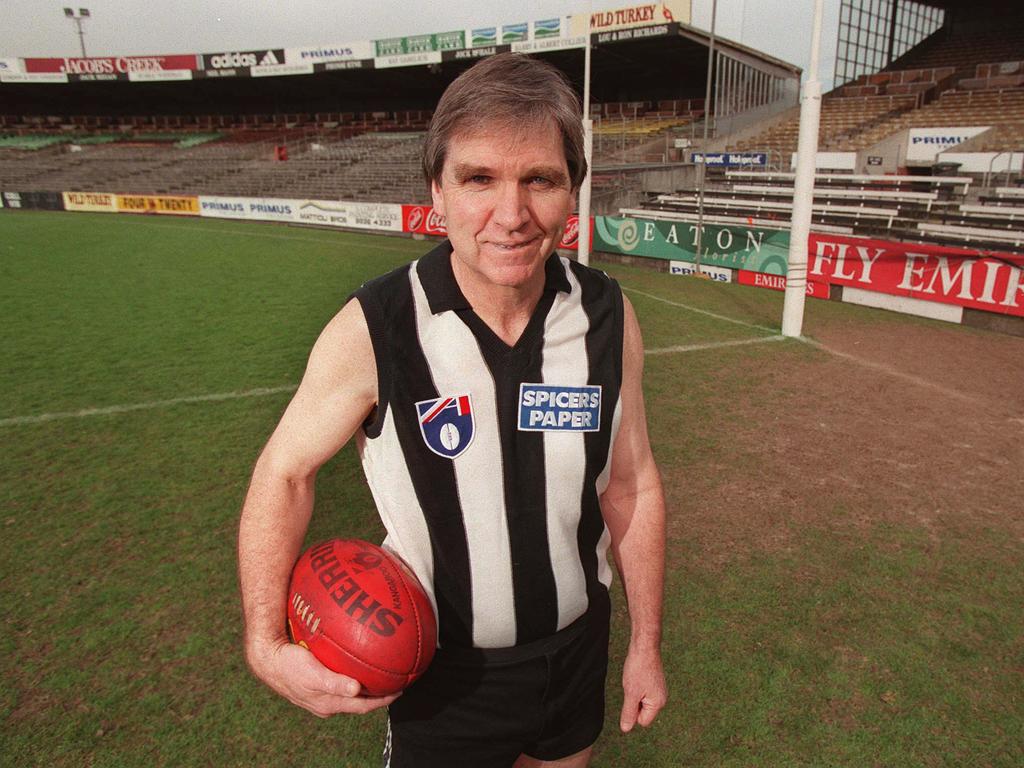
“He’s told me that a million times (that I was his hero) and he’s also told everyone, which gets a bit embarrassing after a while,” McKenna laughed.
“His family were Essendon supporters and his mum took him to Northland on the Monday, where he got a Collingwood jumper and a plastic No.6.
“I think it was one of the main reasons I got chosen to present the cup later on in 2010, and it was fantastic for me having not played in a premiership team.”
His love for Collingwood never wavered, and as a young sports journalist with Channel 10 he’d often go to nightclubs with the likes of Magpie premiership stars Denis Banks and the late Darren Millane.
McGuire swept to power on October 29, 1998, when he stood up on stage at the club’s AGM at the Camberwell Civic Centre and dawned it a new era for Collingwood.
He said the then 106-year club had “again been relegated to battler”, but “tonight is the moment of truth in shaping Collingwood’s future into the twenty-first century.”
At times he doubted whether he was the right man for the job, but McKenna said he had no doubt.
“He was the perfect choice then because, first of all, he’s so passionate about the club,” McKenna said.
“He’s a really, really hard worker and he got the club back on its feet financially.
“He knows so many people and has such a strong personality that he influences people who are important in society, which has helped the club along the way and particularly on the financial side.
“People take to Eddie and he’s a very brilliant speaker in front of a microphone.”
McGuire responded to the enormous task by throwing himself into the job with typical gusto and bravado.
“The first 18 months I didn’t sleep a night,” McGuire said.
“I’d wake up every night at 2 or 3am like clockwork, go into the office and just try to write down all my notes so I could clear my head to go back to sleep.
“Or (my wife) Carla would come in and try to bring me back to sleep.
“It was a really hard period, but it was great and it made me and it was the start of the club coming back.”
One of the key pillars in the McGuire plan was finding the right man to take over from club legend Tony Shaw as coach at the end of 1999.
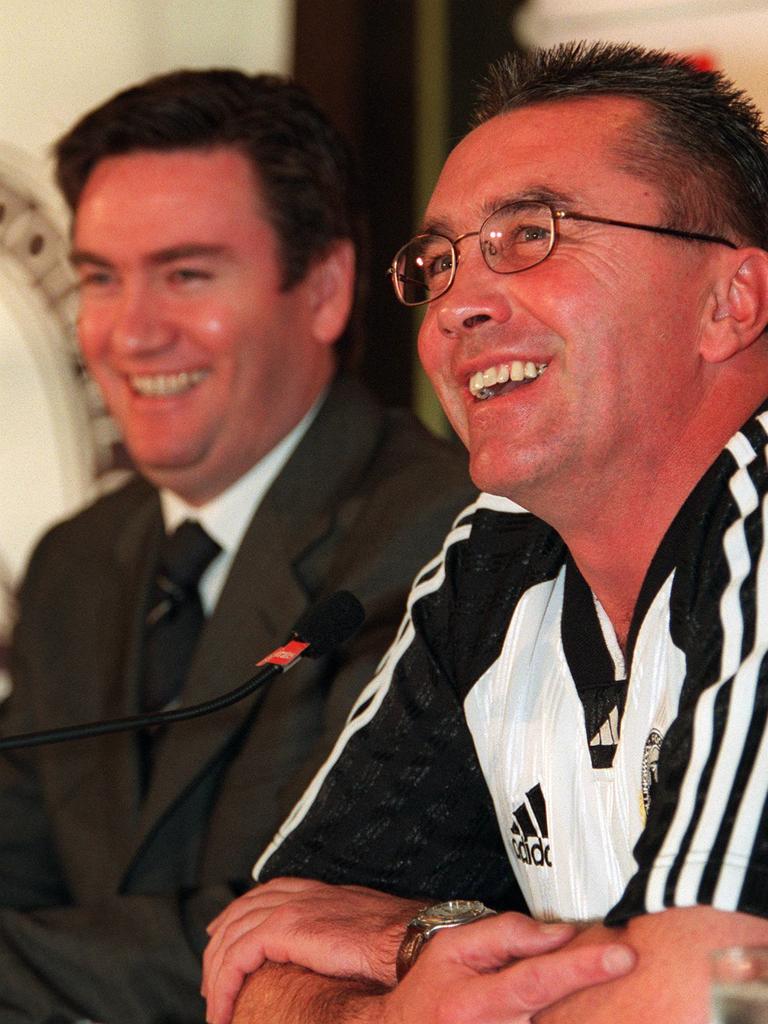
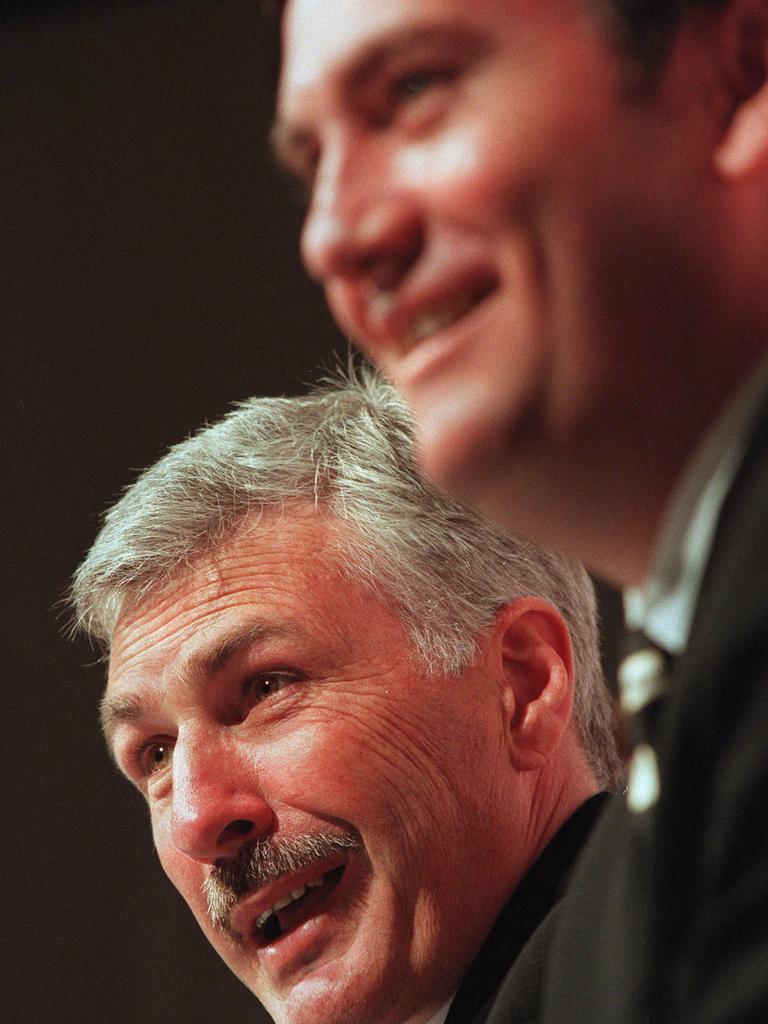
McGuire only had Denis Pagan and Mick Malthouse in mind to replace Shaw, and he met with the latter for a coffee at a cafe down the road from Subiaco Oval in early 1999.
While the initial chat was not football related, a seed was planted.
McGuire made sure of that at the end of the meeting when he is said to have asked Malthouse: “So, how can I get you to Collingwood?”
When Malthouse laughed and said he couldn’t, McGuire reportedly replied: “One day I will.”
Malthouse and his family had been settled in Perth after a decade in the west, but the situation changed when the coach’s mother-in-law was placed into palliative care, triggering a move back to Melbourne.
Shaw, who selflessly played as many kids as he could in 1999 to boost their development for the future, knew the wheels were in motion.
“We had a meeting about 10 weeks out and I knew I wouldn’t be going on,” Shaw said.
“I knew Mick Malthouse had the job, and I know he probably doesn’t say that but we already knew that had happened.
“So, we set out as a match committee to give kids games to accelerate (their development), because we always believed one or two games even before their time will help them.”
McGuire got his man, and famously unveiled a suited-up Malthouse in the front seat of a then club car sponsor amid a sea of razzle dazzle.
Shaw said change at the club was badly needed, even if had come too late for him.
“We needed a viewpoint of maybe getting away from the old school and probably needed an entrepreneurial vision of what was going to happen, and Eddie did that,” Shaw said.
“That, to me, would probably be the greatest thing he’s done for the footy club other than being president of a premiership.”
The Magpies president sold Malthouse on the club’s future move from the rundown Victoria Park to the Olympic Park precinct.
It was long overdue.
When Malthouse first toured the Magpies’ Victoria Park headquarters with then chief executive Greg Swann, he was greeted with mould, rotting floors and decrepit facilities.
McGuire engineered the move to the cutting-edge training facility on the banks of the yarra, which would grow in time to include the more convenient training oval next door.
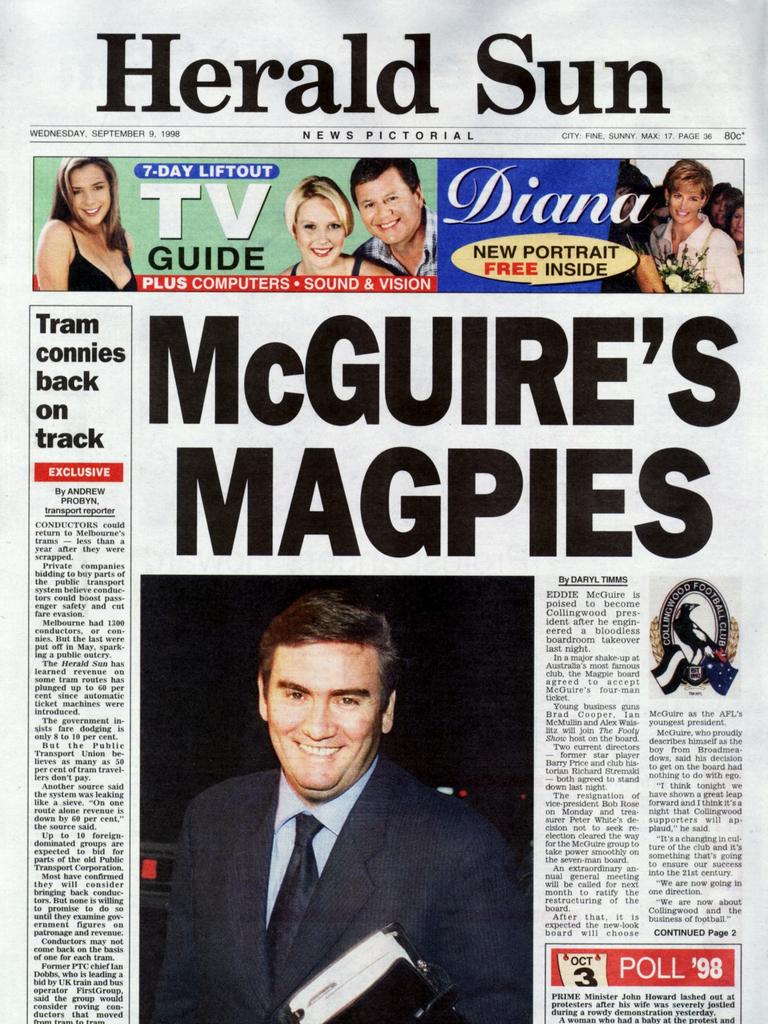
After two grand final defeats in the early 2000s, the Magpies moved from their spiritual home to Olympic Park, which was arguably McGuire’s crowning achievement at Collingwood.
But better was yet to come.
In 2008, the Magpies’ board commissioned then football boss Geoff Walsh to give them a forensic appraisal into where the playing list was at.
Walsh told the board the club would win the flag in 2010.
“We had everything going for us,” McGuire said in the 2010 Final Draw documentary.
“We had the facilities, we had the coaching, we had the psychology, we had committed the resources towards the ultimate success.”
Walsh would prove prophetic, with the Magpies claiming just their second flag since 1958 in the 2010 grand final replay, following a dramatic draw.
“One of the greatest moments of my life, if not the greatest moment,” McGuire said.
“There’s no doubt that for Peter McKenna to walk up on stage and hand Mick Malthouse and Nick Maxwell the premiership cup for Collingwood … it was just a wonderful moment.”
Life could not have been better, but trouble on various fronts was looming just around the corner.
More Coverage
Originally published as Inside the Pies Part I: How Eddie McGuire restored Collingwood to AFL juggernaut








